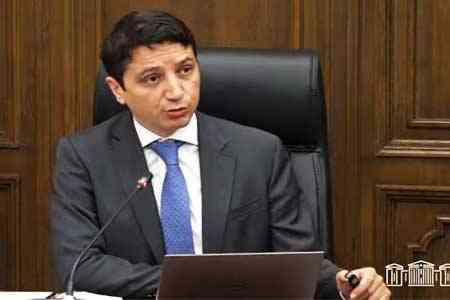


ArmInfo.The Armenian authorities are consistently working to eliminate any types of tax preferences. The Minister of Finance of the Republic of Armenia Vahe Hovhannisyan stated this on June 12 at a meeting of the National Assembly of the Republic of Armenia.
According to him, the government's recent steps to increase turnover tax rates and return business entities to ordinary types of taxation are clear confirmation of this. The main goal of these measures is to bring everyone to a single form of taxation. "But this does not mean that there will be no tax breaks, they will be in one form or another. The question is that we establish some preferences, which we then forget about, and this becomes the norm, which is wrong, since the system gets used to working in greenhouses conditions," the minister emphasized, adding that any preferences should be temporary.
On June 12, the National Assembly of the Republic of Armenia approved amendments to the Tax Code of the country, according to which turnover tax rates will be doubled.
From October 2024, the turnover tax system will be revised, and from 2025, the scope of beneficiaries of the micro-enterprise system will be narrowed. In particular, today a 5% turnover tax rate has been established for entrepreneurs in the field of trading activities, with the possibility of deducting 4% of documented expenses from liabilities, but not less than 1.5% of turnover. As part of the initiative, it is proposed to set a rate of 10% of income with the possibility of deducting 9.5% of expenses, but not less than 1.0% of turnover. Then the effective tax will increase from 2.3% to 4.1%, providing the state treasury with additional taxes in the amount of 4.9 billion drams.
Representatives of public catering at this stage work with a 6% turnover tax with the possibility of a tax deduction of 3% of documented expenses, but not less than 4% of turnover. As the Ministry of Finance previously stated, Armenian restaurateurs currently pay an average of 4.3% of sales turnover, which they assess as a low tax burden. In this regard, it is proposed to establish a 12% turnover tax with the possibility of a tax deduction of 9% of documented expenses, but not less than 3.5% of turnover. In this case, the effective tax will increase from 4.3% to 6.6%, providing the state treasury with additional taxes in the amount of 4.9 billion drams.
Changes are also planned for representatives of production activities. Currently the sales tax rate is 3.5%. It is proposed to set a rate of 7% of income with the possibility of deducting 5% of expenses, but not less than 3.5% of turnover. In this case, the effective tax will increase from 3.0% to 5.3%, providing the state treasury with additional taxes in the amount of 0.6 billion drams. For other types of activities, the current sales tax rate is 5%. It is proposed to set a rate of 10% of income with the possibility of deducting 6% of expenses, but not less than 4.5% of turnover. In this case, the effective tax will increase from 5% to 8.5%, providing the state treasury with additional taxes in the amount of 8.7 billion drams.
The authorities also plan to expand the range of activities prohibited from taxation under the microenterprise tax and turnover tax systems. In particular, from 2025 it is recommended to limit; A. the opportunity to engage in notary, lawyering and organizing lotteries in the value added tax system; b. in the micro-enterprise taxation system, the activities of taxpayers engaged in the purchase and sale and/or rental of real estate, hairdressing services, body care, car maintenance services, software development and construction work, assessment and measurement of real estate, organization activities baths and saunas. They will have to operate either under the sales tax or VAT system. The adoption of the project promises the state treasury an annual increase in turnover tax revenue of approximately 17.8 billion drams.